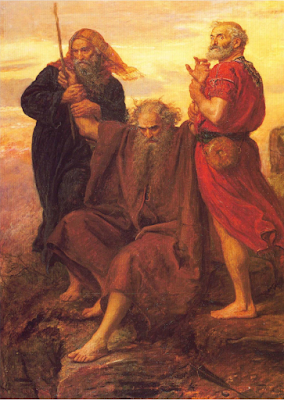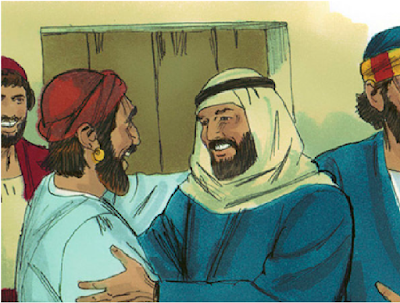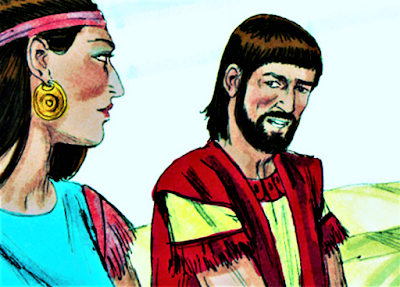Go Deeper: Aaron Helps Moses
Moses holding up his arms during the Battle of Refidim, assisted by Hur and Aaron,
in John Everett Millais' Victory O Lord! (1871).
Our preschoolers are learning that God is good! And we have a lot we can thank Him for. Whenever we see something good, we can say, "Thank you, God!" And remember, that goes for every one of us. Our Bible memory verse is Psalm 107:1, "Give thanks to the Lord for He is good."
In our Bible story "Aaron Helps Moses," we learn that Moses has reason to thank God for his brother Aaron and his friend Hur. And here, go deeper, to learn a bit more about Exodus chapter 17.
First, look at this painting from 1871 by Sir John Everett Millais called, "Victory O Lord!" It depicts Moses overlooking the Battle of Rephidim, with his brother Aaron and friend Hur helping him hold up his arms. And may I say, will you look at Hur's eyes? That stare is intense!
Now, as Chapter 17 opens, it has been about 2 months and 3 weeks since Moses led the Israelites out of Egypt (Exodus 16:1; 19:1). The people have moved from place to place at God's direction. And they have just left the wilderness of Sin and have made camp at Rephidim. When they camped, the people searched the area, but could not find water. And they not only informed Moses about this problem, but they also complained to him about it bitterly, nearly threatening him.
Here, Moses turned to God because He was so frustrated by the Israelites. These people had witnessed, first hand, the Lord God bring them out of Egypt (Exodus 13:3). And God saved them from Pharaoh's army (Exodus 14:31). In chapter 15, they all sang praise to God for defeating Pharaoh's army, throwing both horse and rider into the sea. In the same chapter, at Marah, God showed Moses how to transform their undrinkable water into drinkable water. And, just a few days earlier, in the wilderness of Sin, God fed the people manna and quail, and God would continue feeding them manna, daily, for the next forty year. It's just back in chapter 16. Check it out. And yet here the Israelites are, lamenting that God had brought them out of Egypt just to let them die in the desert.
Well, at God's direction, Moses gathered the elders if Israel--to be witnesses--and led them to a big rock, where Moses struck the rock with the rod of God--the same rod that God gave to Moses to bring the children of Israel out of Egypt. And as soon as Moses struck the rock, fresh water gushed out of the rock, and all the people had plenty of water to drink.
To underline this moment, Moses called this place Massah and Meribah. Massah, which means "testing," because the people had tested God through their complaining. And Meribah, which means "quarreling," because after all that God had done for them, the people still had the nerve to quarrel with God (Exodus 17:7).
Not long after this, the Amalekites began fighting the Israelites. Who are the Amalekites? They are the descendants of Amalek, a grandson of Esau. Esau was Jacob's fraternal twin (Genesis 25:21-27). God renamed Jacob to Israel. So, we have descendants of Esau fighting descendants of Jacob.
So, Moses turned to is aide, Joshua. Time-out for some trivia. Joshua was the son of Nun and of the tribe of Ephraim. He was born in Egypt as a Hebrew slave. His birth name was Hoshea, meaning "salvation." His name reflected a hope that God would yet save His people. And with Yahweh's liberation of the Hebrews from Egypt, Moses renamed Hoshea to Yehoshua, which means "Yahweh is salvation." Yehoshua became Moses' aide. And after the death of Moses, Yehoshua became leader of the Israelites. In English translations of the Bible, the name Yehoshua is rendered as Joshua (Exodus 17:8-14; Exodus 24:13; Exodus 32:15-19; Exodus 33:1-11; Numbers 11:26-29; Numbers 13:1-16; Numbers 14:6-9; Joshua 1:1-2). In Aramaic, the name is pronounced Yeshua. In Greek, it is pronounced Iésous. And in most English translations of the New Testament, it is pronounced Jesus.
Now, back to our story. Moses put Joshua in charge of the Israelite army. And Joshua's first task was to create an army, that day, by choosing men from all the twelve tribes of Israel. The next day, Joshua led the army against the Amalekites while Moses stood on the top of the hill with the rod of God in his hand. While Moses kept his hands raised, the Israelites were winning. But when Moses lowered his hands, the Amalekites were winning. And Moses' arms were getting tired. So, clearly, something had to be done.
Enter Aaron, brother of Moses, along with their friend Hur. Okay, time-out, again. Who is Hur? Hur was a companion of Moses and Aaron (Exodus 17:10-12). Hur was from the tribe of Judah (Exodus 38:22). Hur was a staunch ally of Moses. And Moses trusted Hur to help lead the people while he was away. Moses did so when he left Aaron and Hur in charge the first time that he climbed Mount Sinai to commune with God for forty days (Exodus 24:13-14). And, if we are reading it right, the Bible tells us that Hur was the grandfather of Bezalel, the principal creator of the Tabernacle of the Ark of the Covenant ( Exodus 31:2; Exodus 35:30; Exodus 38:22). There is also a reference to a Hur who was either the son or the father Caleb. But we aren't certain if it is the same Hur (1 Chronicles 2:50-51).
Back to the battle. Aaron and Hur wanted to help Moses. So, they brought over a rock for Moses to sit on, and they stood on either side of Moses to keep his hands raised throughout the remaining battle. And at the end of the day, the Israelites won.
Following the battle, Moses built an altar to God as a memorial to the victory. And Moses called the altar Yahweh Nissi, meaning "Yahweh our Banner." God also told the people that, because the descendants of Amalek waged war against the descendants of Israel, the two would always be at war, from generation to generation.
Finally, a question: Why did the Israelites win the battle? Was it because God strengthened the Israelites as long as Moses was raising the rod of God? Or was it that Moses was praying while is arms were raised and God honored those prayers with a victory? Or were the Israelites so inspired by the latest show of God's power and grace, namely, drawing water from the rock, that the people gave their all at the sight of the rod of God? Well, we don't know. The Bible doesn't tell us. But we do know that Moses had reason to be thankful for his brother Aaron and friend Hur. And the Israelites had reason to be thankful for the grace of God.
-



